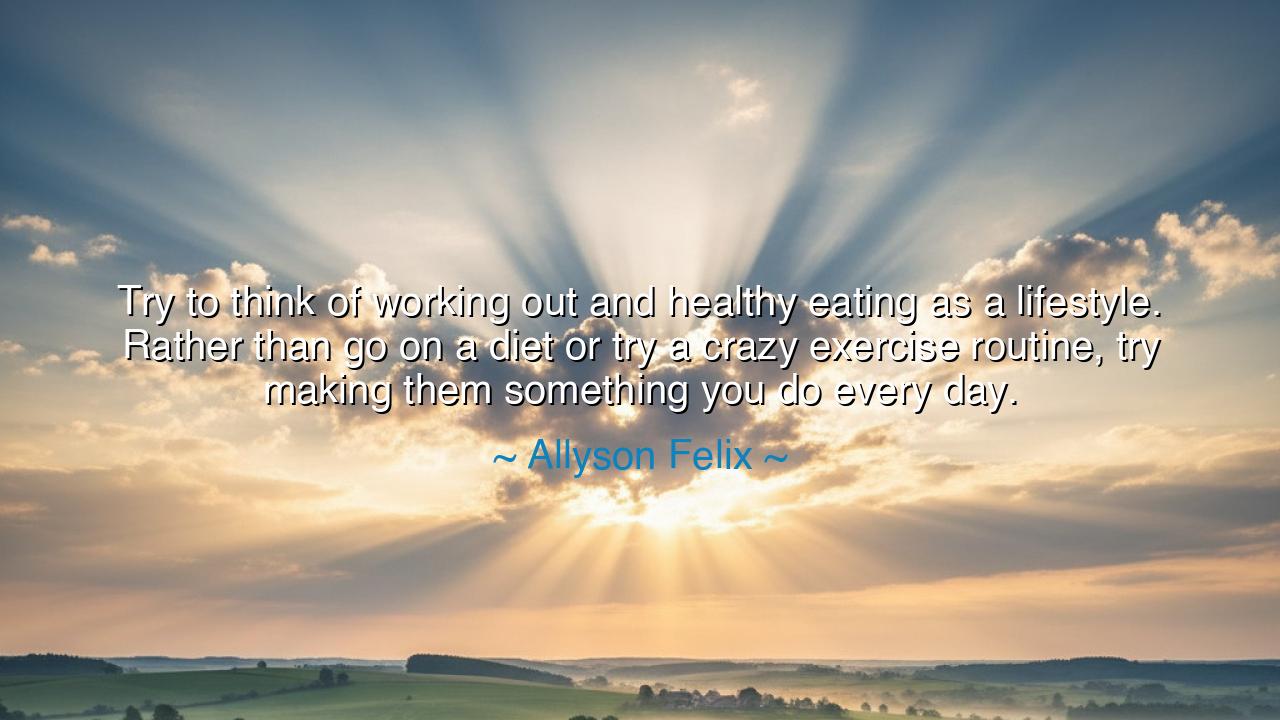
Try to think of working out and healthy eating as a lifestyle.
Try to think of working out and healthy eating as a lifestyle. Rather than go on a diet or try a crazy exercise routine, try making them something you do every day.






When Allyson Felix, one of the greatest sprinters in modern history, said, “Try to think of working out and healthy eating as a lifestyle. Rather than go on a diet or try a crazy exercise routine, try making them something you do every day,” she was not merely offering fitness advice — she was imparting a philosophy of endurance, a timeless wisdom on the art of living with balance, devotion, and discipline. Beneath her calm and modern tone lies an ancient truth: that consistency is greater than intensity, and that real transformation comes not from short bursts of effort, but from habits woven into the fabric of life itself.
Felix’s words remind us that health — of the body, mind, and soul — is not a destination to be reached, but a journey to be lived daily. She speaks of a sacred rhythm, much like the steady beating of the heart or the rising of the sun. For a “diet” begins and ends, but a lifestyle endures. To her, exercise and nourishment are not punishments for indulgence nor tools for vanity; they are acts of respect toward the body — the temple that carries the spirit. The ancients too understood this: the Greeks believed in arete, the excellence of mind and body in harmony. The warrior, the philosopher, and the poet were all united by one truth — that strength, wisdom, and serenity are born of steady, daily care.
The wisdom of Felix’s words can be seen in the story of Milo of Croton, the legendary Olympian of ancient Greece. As the tale goes, he began by lifting a newborn calf each day, and as the calf grew, so did his strength. By the time it had become a bull, Milo could lift it with ease. He did not achieve this through madness or excess, but through small, daily discipline. This is the essence of Felix’s teaching — that greatness, whether in sport, health, or life, is born from repetition, from the quiet power of routine, not the fleeting surge of enthusiasm.
Her rejection of “crazy routines” and “temporary diets” carries deep meaning in the age of quick fixes and shallow promises. Felix reminds us that the path of wisdom is the path of moderation. To chase extremes — to starve today or overwork tomorrow — is to build upon sand. But to move each day, to eat with care, to rest when needed — this is to build upon stone. Her insight mirrors that of Aristotle, who taught that virtue lies in the middle path, between excess and deficiency. In the same way, true health is not born of extremes, but of balance — where the body is neither neglected nor worshipped, but honored as a vessel of purpose.
Felix’s approach to life is not unlike that of the samurai, who believed that mastery of the sword began with mastery of the self. They trained not only in combat, but in breathing, eating, and movement — for they knew that the smallest act, done with mindfulness, shapes the warrior’s spirit. The same applies to Felix’s message: when health becomes a way of life, even the simplest acts — a morning stretch, a mindful meal, a walk in the sun — become part of the art of living well. In this way, fitness ceases to be labor, and becomes ritual, an offering of gratitude for life itself.
Yet Felix’s words are not stern commands; they are gentle encouragements, spoken with the patience of one who has endured. She reminds us that transformation does not come through haste, but through persistence and kindness toward oneself. Just as the tree grows by steady seasons, not by sudden storms, so too must we grow through patience. Her teaching calls us to honor the long game — to shift from seeking results to building resilience. In this way, the body becomes not a battlefield, but a companion; health becomes not a task, but a joy.
The lesson, then, is clear: make wellness a way of being, not a fleeting goal. Move your body daily, not to chase an image, but to celebrate strength. Eat foods that nourish, not just satisfy. Treat your body as you would a loyal friend — with care, consistency, and respect. Do not seek transformation through punishment, but through practice. For in the rhythm of these small daily acts, life itself becomes more vibrant, purposeful, and whole.
So, my listener, remember this: the greatness of life lies not in intensity, but in constancy. As Allyson Felix teaches, make health your companion, not your challenge. Walk with it every day, as the ancients walked with the sun — steady, faithful, and unwavering. In time, you will find that the discipline you once feared becomes the freedom you have always sought — and your every breath, every step, will whisper the truth of her wisdom: that the strongest lives are not lived in bursts, but in balance.






AAdministratorAdministrator
Welcome, honored guests. Please leave a comment, we will respond soon